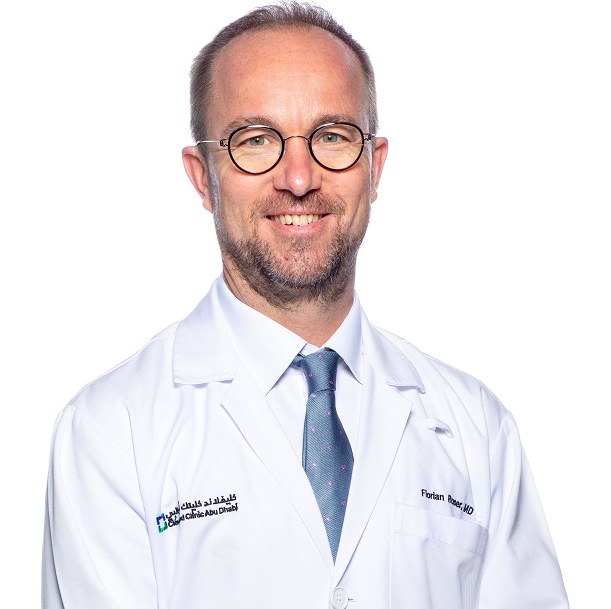
Cleveland Clinic Abu Dhabi experts restore genetically induced hearing loss in young patient
- Pioneering auditory brainstem implant surgery now available at Cleveland Clinic Abu Dhabi
- Cleveland Clinic Abu Dhabi joins exclusive list of worldwide centers offering auditory brainstem implant surgery
Cleveland Clinic Abu Dhabi, a Mubadala Health partner, performed a groundbreaking auditory brainstem implant (ABI) on a near-deaf patient suffering from a genetic disease that led to multiple large benign intracranial tumors, resulting in near total hearing loss. The implant was the available option for the patient to recover some hearing and not go completely deaf.
.jpg)
Shaikh Shamshuddin, a 36-year-old male, had neurofibromatosis, a genetic condition, that had, over time, led to the growth of several benign brain tumors. He underwent surgery at another hospital that was unable to remove all of his tumors. His condition worsened, and he developed two large tumors in his brain that were compressing crucial areas that impacted his hearing.

By the time he was admitted to Cleveland Clinic Abu Dhabi, he was experiencing nearly complete hearing loss and his family had become increasingly concerned about his condition.
“I couldn't hear through both my ears, and we were praying to get a good doctor and a good hospital,” says Shaikh.
As his condition deteriorated the family turned to Cleveland Clinic Abu Dhabi, where Dr. Florian Roser, Chair of the Neurological Institute at Cleveland Clinic Abu Dhabi, explained to Shaikh and his family that the tumor permanently affected the functioning of the hearing nerve, which meant an external hearing aid wouldn’t solve his problem. Instead, Dr. Florian suggested a procedure called an auditory brainstem implant (ABI).
.jpg)
Dr. Florian elaborates, “Shaikh was a patient with a genetic disease leading to multiple large benign intracranial tumors. These were not only potentially life-threatening, but patients with these types of tumors often lose hearing as the tumors develop close to the hearing nerve. The plan was to first take care of the tumor resection as a life-saving procedure. At the same time, we needed to find a solution for his hearing loss. Implantation of an auditory brainstem implant was the best option for him, as it would help him regain some of his hearing capacity.”
An ABI, while not capable of granting a patient entirely new hearing, can still help them detect sounds. It is a surgically implanted device that provides a sensation of sound to a person who has severe hearing loss due to damage to the auditory nerve. Although the design and function of the cochlear and auditory implants are similar, the devices are different. The cochlear implant is used in individuals with cochlear damage, but they still have a functioning auditory nerve. The auditory brainstem implant on the other hand, bypasses the inner ear and the auditory nerve. It uses an array of electrodes to stimulate the hearing pathways on the brainstem directly.
Dr Florian adds, “It's not as though when we switch the device on, you have new hearing. However, many patients have reported improvements in their sound awareness and lipreading abilities after an ABI.”
Cleveland Clinic Abu Dhabi’s multidisciplinary team of neurosurgeons and ENT surgeons is now capable of successfully executing this complex procedure close to home, reinforcing its position as a beacon of advanced medical care in the region.
A UAE-based surgical team performed this procedure on Shaikh, entailing two delicate surgeries to resect the brain tumors first, which were high risk procedures, as crucial centers of the brainstem were involved. The first step involved removing the tumor on the side where the implant would be positioned. The second vital step was the preservation of the facial nerve to retain his facial expression and movement, his ability to smile and close his eyes, and then, the delicate and intricate placement of the implant. As a third step following the tumor surgery, the implant was positioned in a specific sub-millimeter area of the brainstem to receive auditory stimulation right on the brain. This cable was then connected to a computer device implanted behind the ear under the skin.
“Dr. Florian took all fear away from me,” says Shaikh. “He explained everything to me as if I was his family,” he adds.
Cleveland Clinic Abu Dhabi’s Department of Neurosurgery and ENT together completed the surgery on Shaikh successfully to the delight of both him and his overjoyed family. After the implant was activated and three months after the surgery, Shaikh was able to hear sounds that helped him function in his everyday life, helping him to orientate himself. For example, hearing the fire alarm, direction from where cars are approaching, and the phone ringing.
“I was very excited when the implant was activated for the first time. The beeping sound of the monitor was the first sound I heard after about a month and a half of complete hearing loss. After three months my hearing slowly improved, and I can now understand a little when someone is speaking. I cannot express my gratitude enough to Cleveland Clinic Abu Dhabi for how they have changed my life,” Shaikh rejoices.


























